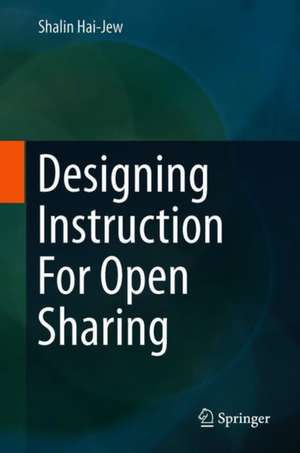Designing Instruction For Open Sharing
Autor Shalin Hai-Jewen Limba Engleză Hardback – 23 ian 2019
The main concept of this work is that design learning for open sharing, requires different considerations than when designing for closed and proprietary contexts. Open sharing of learning contents requires a different sense of laws (intellectual property, learner privacy, pedagogical strategies, technologies, media, and others). It requires different considerations of learner diversity and inclusion. It requires geographical, cultural, and linguistic considerations that are not as present in more localized designs. The open sharing aspect also has effects on learner performance tracking (assessments) and learner feedback.
This textbook targets students, both undergraduate and graduate in computer science, education and other related fields. Also, professionals in this field managing online systems would find this book helpful.
Preț: 409.89 lei
Nou
Puncte Express: 615
Preț estimativ în valută:
78.44€ • 81.59$ • 64.76£
78.44€ • 81.59$ • 64.76£
Carte tipărită la comandă
Livrare economică 15-29 aprilie
Preluare comenzi: 021 569.72.76
Specificații
ISBN-13: 9783030027124
ISBN-10: 3030027120
Pagini: 467
Ilustrații: XXIV, 516 p. 196 illus., 133 illus. in color.
Dimensiuni: 155 x 235 mm
Greutate: 0.93 kg
Ediția:1st ed. 2019
Editura: Springer International Publishing
Colecția Springer
Locul publicării:Cham, Switzerland
ISBN-10: 3030027120
Pagini: 467
Ilustrații: XXIV, 516 p. 196 illus., 133 illus. in color.
Dimensiuni: 155 x 235 mm
Greutate: 0.93 kg
Ediția:1st ed. 2019
Editura: Springer International Publishing
Colecția Springer
Locul publicării:Cham, Switzerland
Cuprins
1 Understanding the Open Sharing Learning Environment Online and Local Starts.- 2 Profiling Target and Potential Learners Today and into the Future.- 3 Thinking about the Learning Design: Theories, Models, Frameworks, and Heuristics.- 4 “Street Legal” Open-Shared Learning.- 5 Core Technology Considerations: Equipment, Authoring Tools, Digital Editing Tools, and Hosting Platforms.- 6 Establishing and Applying Contemporaneous E-Learning Standards: Evolving Stylebooks and Planning Work.- 7 Early Designs, Prototypes, and Learning Sequences for Exploration and Decision Making.- 8 Content Development (with Work Documentation).- 9 Alpha Testing, Beta Testing, and Customized Testing.- 10 Open Sharing: Launching, Outreach, Publicity, Usage Monitoring, and Post-Launch Care.- 11 Some Possible Futures of Openly Sharing Learning.
Notă biografică
Shalin Hai-Jew has been working as an instructional designer at Kansas State University since 2006, and she has worked on a number of projects, including those related to biosecurity, turf grass management, grain science, game design, one health, public health, PTSD, mental health, social justice, and other federally funded projects. She has also worked on hundreds of online courses in her line of work. She has worked as an instructional designer here since 2006. She has created open-shared learning objects (all bylined) for a number of years, and these have been shared through a variety of publications, slideshow-sharing platforms, websites, and other spaces; some of these are listed in learning object referatories.Dr. Hai-Jew earned BAs in English and psychology and an MA in English from the University of Washington (in Seattle), and she earned an EdD from Seattle University (where she was a Morford Scholar). She has continuedher learning with university courses, both undergraduate and graduate, since her formal degree-based studies. She has received a number of scholarships and awards in higher education. She tested into the University of Washington at age 14 and started her studies there at 15 and earned two baccalaureate degrees by the time she was 18 and her first graduate degree by 20. She is a major believer in the power of education at all levels to change lives.In her professional life, she has worked in the public and private sectors. In general, she has worked as a college professor, both in the USA and abroad. She worked as a college instructor in the People’s Republic of China for 4 years (1988–1990, 1992–1994), the latter 2 years with the United Nations Volunteer Programme (UNV) of the United National Development Programme (UNDP). She worked for The Boeing Company as a faculty fellow for two consecutive summers. She worked for Catholic Community Services, a nonprofit organization, for one of her first jobs out of university.She has edited a number of academic texts and authored a few, with multiple major publishers. She is interested in human learning; online teaching and learning; research design, quantitative and qualitative data analytics methods, machine learning, and data visualization; and other related fields. She is working on multiple publishing projects currently, including an edited text on online survey research and an authored text on mapping electronic hive minds on the Social Web and Internet. She has served on a number of editorial advisory boards related to publications focused on educational technologies. She has served on the steering committee for Colleague 2 Colleague (C2C), a nonprofit professional organization for a number of years, and she co-edits the C2C Digital Magazine.For some more information and some basic third-party metrics:
ORCID ID: 0000-0002-8863-0175
Researcher ID: J-3022-2018
Publons Profile: https://publons.com/author/1268346/shalin-hai-jew#profile
Google Scholar Citations: https://scholar.google.com/citations?user=0ungL5gAAAAJ&hl
ORCID ID: 0000-0002-8863-0175
Researcher ID: J-3022-2018
Publons Profile: https://publons.com/author/1268346/shalin-hai-jew#profile
Google Scholar Citations: https://scholar.google.com/citations?user=0ungL5gAAAAJ&hl
Caracteristici
Relevant to those learning how to design online learning for a large audience. This textbook will help the reader understand up-to-date applied educational theories and practices. This topic has wide implications for work in universities, industry, and the public sector. It is no longer fashionable to just stay within a proprietary and protectionist channel. This topic also has implications on those who manage web-facing and Internet-facing learning repositories, learning referatories, LMSes, wikis, video hosting sites, and other online learning spaces This tutorial-type textbook is highly applied and practicable.
